
"Within Our Gates" was at least partly in response to D.W. Griffith's landmark 1915 epic film "Birth Of A Nation". That film was quickly hailed as a masterpiece that immediately influenced film-makers everywhere. It is still considered one of the most important films of all time and is required viewing at any film studies course. Unfortunately it was also vile racist propaganda that explicitly portrayed a message of white supremacy and inherent black savagery. The premise of the film was to show the White South's version of the Civil War and Reconstruction eras. Namely that;
a) Slavery was benign and the slaves were well treated, loyal and happy until Northern abolitionists and half breeds got them all riled up with wanting their freedoms and stuff.
b) Civil War was thus forced on the South.
c) The War disrupted the South's idyllic way of life. Lincoln wanted to be lenient but was assassinated, leaving radicals and half-breeds in charge who set up corrupt governments which robbed and oppressed honest white folks.
d) Freed black slaves were unable to handle their new responsibilities and became drunken rapists in search of white women.
e) Therefore the K.K.K was formed to protect white women and restore order and the South's "Way of life".
THE KLAN "REDEEMS THE SOUTH FROM BLACK RULE";

The film is explicit in it's portrayal of blacks. In the Antebellum (pre-war) South slaves are shown as happy, obedient and loyal, at one point actually breaking into a song and dance routine for their kind and considerate masters. After the Civil War blacks are shown as drunken, lazy, slovenly, thieving, rapists who were being exploited by arrogant Northern oppressors. Half breeds are shown as being particularly villainous and dangerous. Anyone who puzzles over some of the oddly retrograde racist comments frequently made today by Tea Party Republicans in the South really should see "Birth Of A Nation" for an example of their world view. That the film would actually play in parts of the South on and off from it's release in 1915 into the Civil Rights Era reveals the film's emotional connection to Conservative Southerners.
Even at the time the film was hugely controversial. There is a famous story that President Woodrow Wilson (a Southerner whose father had been a Confederate officer, as had Griffith's) praised the film as "History wrote written by lightning. The tragedy is that it is all so true."
THE KLAN RIDES TO THE RESCUE:
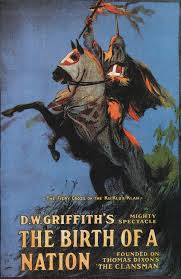
(Note; Modern research has shown that this quote was almost certainly a creation of Griffith or the film's writer Thomas Dixon. In fact while Wilson did arrange for a White House showing of the film (as did the Supreme Court), he may have been called away about half-way through and never saw the rest until later if at all. Meaning he probably only saw the first part of the film, that is the dramatic and not-terribly racist Civil War scenes, but perhaps not the second half with the openly racist homage to the K.K.K. At any rate he made he actually made no public comment about the film and the prim & proper Wilson was apparently uncomfortable with the film's sexual violence. Letters from Wilson show that he was in fact resentful about Griffith's claim of a Presidential endorsement and felt he had been used. This kind of publicity stunt was not uncommon at the time and Griffith was if nothing else a shameless self-promoter with many of his claims have since proven to have been exaggerated or downright made up.)
The film's huge success and it's racist themes did not go unchallenged though. From it's release many black leaders and newspapers denounced the film and it's retrograde glorification of the Antebellum and Reconstruction South and it's vicious racism. Protests and boycotts were organized in many cities. Griffith actually felt quite hurt by the angry black response and wrote an editorial insisting that his film was not racist at all. To prove it by 1916 he would make his own film response with his next film "Intolerance". That film is another classic epic, justly famous for it's complex plot-lines and huge panoramic crowd scenes and massive and elaborate sets. Unfortunately the film's message, while no doubt well meaning, is sanctimonious and muddled. Worse it does not even deal specifically deal with race and has no black cast members. Clearly a more direct response was needed. Preferably by a black director. Enter Oscar Micheaux.
Micheaux is often credited as being the first black film director. This is not actually true since George Johnson's Lincoln Motion Picture Company had made a few feature films as early as 1915. There may even be earlier shorts but if so there is no record of this. But even so Micheaux can take credit for making the first truely important black film epic.
OSCAR MICHEAUX;
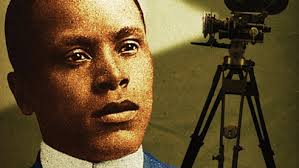
Oscar Micheaux was born in Metropolitan, Illinois in 1884 to a family of former slaves from Kentucky, he later married and moved to South Dakota to become a farmer. That didn't work out very well as the farm failed and his wife left him after clearing out their bank accounts. After working as a Pullman Conductor for a while he decided to become a writer, with seven novels starting in 1913. By 1918 he was successful enough that George Johnson's Lincoln Pictures wanted to make one of his novels into a film. However negotiations broke down and Micheaux decided to move into films on his own with his first film "The Homesteader". Unfortunately this film is now lost but it did well enough to finance his most ambitious project yet.
By 1920 much had happened since "Birth Of A Nation". World War One had broken out and even before America had entered the war some blacks had enlisted in the French Army and Air Force where they had distinguished themselves and experienced life in Europe where segregationist Jim Crow laws did not exist. After America thousands more rushed to enlist in the American Army with many seeing action. While in Europe many were exposed to the new sounds of Ragtime and Jazz which became popular among whites. When they returned home they figured they had proven their patriotism and earned the right to be treated as equals. They were wrong. Instead they were greeted with race riots, lynchings and repression as the Klan was reborn and Jim Crow was re-imposed. "Within Our Gates" was an attempt to explain this reality and respond to Griffith's retrograde view of the "Gallant South" and his glorification of the K.K.K.
The film was also a chance to show aspects of black society beyond the simplistic minstrel show stereotypes of the era with a focus on the types of "aspirational" black roles blacks would have to take on to "uplift the race", while denouncing those roles that "held the race back".
~~~~~~~~~~~~~~~~~~~~~~~~~~~~~~~~~~~~~~~~~~~~~~~
"WITHIN OUR GATES:
Synopsis (spoiler alert);
Cast;
Evelyn Preer ~ Sylvia Landry
Flo Clements ~ Alma Pritchard
Jack Chenault ~ Larry (The Leech) Pritchard
Charles D. Lucas ~ Dr.V. Vivian
William Stark ~ Jasper Landry
Mattie Edwards ~ Mrs. Landry
William Smith ~ William Gentry
James D. Ruffin ~ Conrad
Edward G. Tatum ~ Efram The Manservant
Ralph Johnson ~ Phillip Gridlestone
Grant Gorman ~ Armand Gridlestone
Bernice Ladd ~ Geraldine Stratton
Mrs. Evelyn ~ Elena Warwick
Leigh Whipper ~ Rev. Ned
Grant Edwards ~ Emil Landry
Plot SUMMARY (spoiler alert);
Sylvia Landry is an unemployed black southern school teacher visiting her cousin Alma Pritchard in Boston. She is waiting for her fiancee Conrad to return from Canada where he is working in the bush so they can be married. Alma, who is divorcee, also has a secret crush on Conrad. Alma's step brother Larry The Leech is a thief and a gambler who has designs on Sylvia.
JACK CHENAULT AS LARRY THE LEECH:

Alma encourages Larry in his pursuit of Sylvia although she politely rejects him but says they are still friends. Detective William Gentry is on the lookout for Larry The Leech, while he tails him Larry he goes to a gambling game with a professional card sharp named Red and some other players. During the game Red is caught cheating and a gunfight erupts as the lights go out and Red is killed. Gentry bursts in but Larry escapes. In the darkness Gentry can not be sure who fired the fatal shots although the audience knows it was Larry. That night Sylvia has a nightmare in which she sees Larry kill a man. She tells the dream to Alma who dismisses it.
RED AND LARRY THE LEECH;
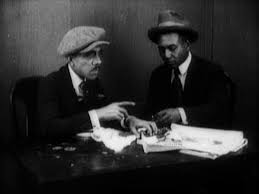
Meanwhile Alma has intercepted a telegram from Conrad telling Sylvia he is on his way home. Alma hides the note. Conrad arrives while Sylvia is out. Alma flirts with him but he rejects him. She tells him she has been unfaithful with Larry. Sylvia has returned with Larry, Conrad sees them and is enraged. Larry flees as Conrad attacks Sylvia and tries to strangle her. He stops but will not listen to her pleas. He leaves her. She leaves Boston.
The scene now moves to a black school in the south called The Piney Woods School. It is run by Rev.Jacobs and his sister Constance. The school is respected but underfunded and overcrowded. Sylvia comes looking for a job, she is hired. The school is faced with closure due to mounting costs and the government refuses to help. Sylvia agrees to return to Boston and do some fundraising.
Meanwhile back in Boston, Larry has eluded arrest for Red's murder although Gentry still suspects him and keeps him under watch. Also in Boston we meet Dr.Vivian, he is a respected light-skinned black doctor who is a Republican supporter of Teddy Roosevelt. He has been reading about the attempts to fundraise. Sylvia is attacked by a purse-snatcher. Dr.Vivian witnesses this and rescues her along with a white policeman who arrests the purse-snatcher.
We also meet Mrs.Geraldine Stratton who is a middle aged white Southern Society Woman now living in Boston. She is a racist who opposes black suffrage and supports segregationist Mississippi Senator James K. Vardaman's bill to deny blacks the vote.
BERNICE LADD AS GERALDINE STRATTON;
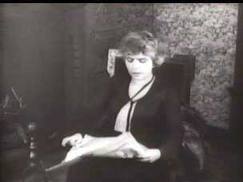
Sylvia's fundraising efforts have not been successful. One day while sitting on a park bench depressed she sees a small white child about to be hit by an expensive chauffeur driven car. She jumps up and pushes the child out of danger but is hurt herself. The car is owned by Mrs. Elene Warwick, a wealthy and elderly white society widow who has Sylvia and the child rushed to the hospital in her car. As Sylvia recovers Mrs. Warwick visits and asks what she can do to help. Sylvia tells her of her fundraising efforts for the school. Warwick agrees to help and tells her to visit when she is better. When Sylvia visits Warwick's home she promises her $5,000, the amount the school needs for the year.
After a grateful Sylvia leaves, Warwick asks her friend Geraldine Stratton for advice since Stratton is from the South. Stratton tells her that blacks are ignorant and should be kept in line and not educated, nor should they be allowed to vote. She delivers a racist rant and suggests the best way to spend money to keep blacks compliant to is to pay off corrupt preachers like Rev.Ned to keep them in line.
There is a flashback to Rev. Ned who is shown preaching a fiery sermon which urges blacks to reject the money and success of whites so they can instead be rewarded in heaven. Some of his parishioners sleep through his sermon. Then he energetically demands donations. Later he visits his white patrons who tell him that they will not allow blacks to vote. His demeanor has changed. Now he is meek and subservient. He assures them he agrees and he will keep his parishioners in line. The white men laugh and abuse him, he laughs as well and leaves. Outside the room however he feels shame about selling out his people and shuffles off. The flashback ends.
LEIGH WHIPPER AS REV. NED;
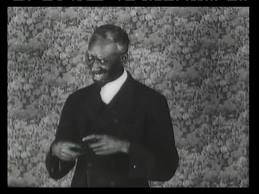
Stratton is still delivering her racist speech to Mrs. Warwick who is visibly disturbed but does not respond. Stratton leaves. Sylvia arrives and talks with Warwick. Sylvia has already send a telegram to Rev.Jacobs promising money but does not say how much, she tells him to wait. Warwick meets again with Stratton and tells her that she can not agree with her racist politics and that she was going to give the Piney Woods School $5,000 but after thinking about it she has decided to raise it to $50,000. Stratton is shocked and offended. She storms out. Warwick shakes her head.
SYLVIA LANDRY AND MRS. WARWICK;

Dr.Jacobs has been thinking about Sylvia, he dreams of marriage. She declines stating her place is at the school. She returns to Piney Woods with the check from Warwick.
Larry has left Boston for Vicksburg still under suspicion. He has come up with new scams. He decides to blackmail Sylvia (we do not told over what but presumably their non-existant affair) to get the new money for the school. She is distraught and leaves Piney Woods School and returns to Boston. Larry follows her, he is in turn still shadowed by Gentry. Larry returns to crime, breaking into a house to rob their safe. Gentry spots him and bursts in, a gunfight breaks out and Larry is wounded (we do not learn what happens to Gentry) and escapes. He runs into Dr.Vivian who rushes the wounded man to his office and tries to save him but Larry dies. Alma arrives after Larry's death. Dr.Vivian asks her about Sylvia. Alma is feeling guilty and tells him how she broke up Sylvia's engagement to Conrad. Alma then tells him the story of Sylvia's past life in the South.
There is another flashback; Sylvia is a young woman living on a small farm with her adopted parents, Jasper and Mrs. Landry and their young son Emil who appears to be about ten years old. They are poor sharecroppers but have managed to provide for a good education for both Sylvia and Emil. The local landowner is Phillip Gridlestone, an elderly white man. He is a cruel, racist tyrant who lives with his black manservant Efram who is a conniving gossip who sucks up to Gridlestone by spying on the black sharecroppers. He tells Gridlestone that Sylvia Landry has gotten too much education and the Landrys are getting uppity. An angry Gridlestone swears he will put Jasper in his place. Jasper arrives to settle his accounts with Gridlestone. Sylvia has kept careful financial records which disagree with Gridlestone's. Gridlestone is outraged and tells Jasper that "Only the white man's law matters" he reminds Jasper that his father was a slave owner who knew how to keep blacks in line. He strikes Jasper while Efram, who has been listening outside laughs.
EDWARD G. TATUM AS EFRAM THE MANSERVANT;
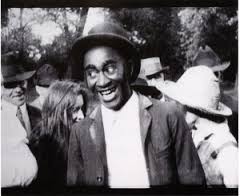
Meanwhile we see a poor white Hillbilly farmer outside the window. He is dressed as a stereotypical hillbilly with ragged clothes and beard, he carries a shotgun. We are informed that he owes Gridlestone money and that he has also been abused by him. He sees an opportunity for revenge. He shoots Gridlestone through the window while he accosts Jasper. The Hillbilly then flees as does Jasper. Efram has heard the commotion but not actually seen it. He enters the room and assumes that Jasper has killed Gridlestone and runs off to tell the white townspeople. An armed white mob forms.
THE HILLBILLY GUNMAN:
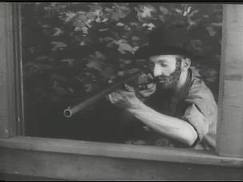
Mrs. Jasper has had a premonition of violence. Jasper returns home and the Landry Family flees into the woods, crossing a river. The mob, joined by the Hillbilly chases after them and looses them in the dark. The Hillbilly is accidentally shot dead by the mob while lurking in the woods. Efram has also joined the mob and is enjoying the attention he has gotten. However the mob has gotten frustrated with the Landry's escape and decide to lynch Efram instead.
THE END FOR EFRAM
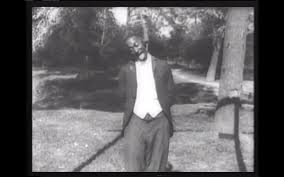
The mob eventually catch Jasper, Emil and Mrs. Landry and brutally lynch them, then set fire to their bodies. Young Emil however escapes although he is shot and wounded.
JASPER AND MRS LANDRY ARE LYNCHED;
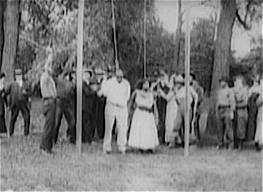
Sylvia is not with the Landrys, she is hiding out at a friend's house. She is spotted by Gridlestone's brother Armand who bursts in and attempts to rape her. She tries to fight him off but he is only stopped when he discovers a scar on her left breast which tells him that she is actually the daughter he had with a black woman and abandoned years earlier. He had paid the Landrys to adopt her provide for an education. We are shown newspaper headlines which claim that Jasper murdered a defenseless Gridlestone while drunk. The press accounts say they died while resisting arrest and that Efram died by accident. The flashback ends.
ARMAND GRIDLESTONE ATTACKS SYLVIA:

Dr.Vivian has found Sylvia, he professes his love and delivers a patriotic speech about America saying that blacks should be proud of their role in it. He proposes marriage, she accepts, they are wed.
DR. VIVIAN AND SYLVIA:

~~~~~~~~~~~~~~~~~~~~~~~~~~~~~~~~~~~~~~~~~~~~~
Aesthetics And Themes;
Exactly how much the film cost and how he raised the cash is not known but his novels had sold well and he had made some wealthy white friends who he was able to tap into. Even so clearly he was operating on a much smaller budget than Griffith had. Micheaux does not use the elaborate sets or the vast army of extras and he reportedly could only afford to a few takes of a given scene so he must have planned out carefully. The film was considered lost for many years until a copy was found in Spain in the 1970's and restored, prior to this it was impossible to properly assess the film from the few stills and newspaper accounts of the time, this also accounts for it's relative obscurity. In the various film history books I have (which predate the film's rediscovery) there is not one mention of Micheaux or his film with only a few black history writers taking note but usually in ways that suggest they had not actually seen the film.
It was always assumed that given Micheaux's limited resources and experience that "Within Our Gates" was a relatively crude film but actually watching it proves conclusively that this is not so.
The film is easily up to the standards of other regular Hollywood productions of the day, including the earlier, pre-big-budget-epic Griffith. Micheaux makes effective use of the full arsenal of close-ups and cross-cutting, although the camera is mostly static and does not have Griffith's trademark tracking shots. The sets seem to be all straight forward locations rather than studio sets. A few sequences show that Micheaux had been paying close attention to Griffth's cross-cutting techniques and put them to effective use to rebut the message of "Birth Of A Nation". Of particular note is the lynching sequence. In Griffith's film the sequence is a dramatic back-and-forth showing the evil black character attempting to rape Lillian Gish's character and the Klan riding to her rescue. The message is clear; white women must be protected from the animal lust of black men, and since the government is not strong enough for the job white men must do so through the Klan. In Micheaux's film the savage lynching of the innocent Landry family by a white mob is inter-cut with the brutal rape of Sylvia by the white plantation owner. Micheaux thus responds to Griffth's fantasy with a far more accurate (if symbolic) portrayal of the reality of white justice in the South. It's also worth pointing out the relatively explicit nature of Micheaux's film. The lynching of the innocent Landry family is brutal and grossly unfair, the mob is even shown putting a noose around the neck of the child Emil, who then escapes after being shot. The mob's bloodlust not being sated by the lynchings, they then set their dangling bodies on fire, a common finale to Southern lynchings, and one glossed over by Griffith. This may in fact be the most truly horrifying in all of silent film.
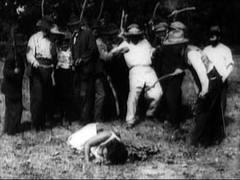
The rape scene is also shown as clearly violent and without provocation as the rich white plantation owner attacks Sylvia under the stern fatherly gaze of a portrait of Abraham Lincoln, the great emancipator. This entire sequence is actually one of the most powerful and well constructed in American silent films. Also worth a mention is the sequence showing Mrs.Warwick deciding whether or not give money to Sylvia. She shows meets with Sylvia, shows sympathy and promises help, then meets with Mrs. Stratton who tries to dissuade her. Warwick gives no indication of her intentions. She meets again with Sylvia and then again with Stratton and only then reveals her true intentions. Micheaux does and effective job of stringing the audience along giving no clue to her eventual generosity. The Rev. Ned sequence is well done and has some funny reaction shots from the congregation. They are actually the only signs of humour in this earnest film. It's actually quite surprising that he would show such skill in what was only his second film since he had no prior film or theatre experience. He had clearly been studying other film-makers very carefully, especially Griffith, and he was obviously a quick learner.
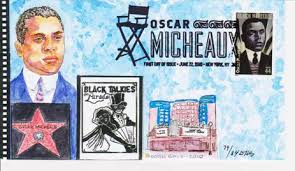
Conservative critics might point out that the white characters in the film are simplistically evil caricatures who exist for no other reason than to be evil racists. The lynch mob are nameless and practically faceless, but there are too many detailed accounts of racist lynch mobs enraged for far less reason than those given in the film to find the events in the film implausible. The actions of Armand Gridlestone are a convenient plot device (would he really chose that particular moment to attack Sylvia?) but he's meant to symbolize the systematized rape of female slaves at the hands of their masters and as a rebuttal of the long held image of black men as sexual predators preying on white women, an image vividly portrayed by Griffith, and deeply resented. It's been noticed that the character of the racist Southern Belle Mrs. Stratton is another direct slap at Griffith in that she bears a striking resemblance to the typical female from Griffith's films such as Mary Pickford, Blanche Sweet and the Gish Sisters; blonde, round faced and wholesome. Micheaux himself admitted that this resemblance was not a coincidence. Conservatives might also object to the Hillbilly characters as being the sort of simplistic stock Hillbilly caricatures that would not be tolerated today. They are shown as ignorant and violent shotgun toting rubes, shirtless and bearded wearing bib overalls, including a gun toting woman. Such stereotypes were however perfectly commonplace in Hollywood features of the time as well, most famously the successful rustic melodrama "Toll'Able David" and even more so in the music industry the advertising for which would rely on the barefoot, bearded, toothless Hillbilly image for the next twenty years. At any rate Micheaux shows the poor whites as also being victims of the Southern economic system as well, pointedly stating that the un-named Hillbilly farmer who shoots Phillip Gridlestone had been abused by the autocratic landowner who had called him "No better than a nigger". The leaders of the whites are instead the wealthy Gridlestones and Strattons with the lynch mob leaders noticeably not being hillbilly types at all but instead dressing in respectable middle-class clothes and living in town rather than in the hills or on the farm. It's perhaps worth noting that Micheaux himself was born and had grown up in Illinois and lived in South Dakota but had never actually lived in the South and most likely never met any poor Southern whites so he may have been willing to accept the hillbilly stereotypes then commonplace.
Micheaux was not without hope for whites though as seen through the saintly character of Mrs. Warwick who acts as a stand-in for those white abolitionists and civil rights workers who had sponsored groups like the NAACP and numerous black schools in the South. Micheaux himself had cultivated some wealthy white friends who had lent him seed money to start his studio. Note that the Piney Woods School was and still is an actual black school in Mississippi. While Micheaux holds white Southerners in contempt he still believes in America as is shown in the final strident speech given by Dr.Vivian in what is easily the least romantic marriage proposal in film history. The very idea of taking that moment to wax patriotic about the occupation of Cuba and World War One would be laughable without the context of the message of the film. Micheaux, like most black leaders of the time, placed his hope in the Republican Party which at the time was still seen as progressive on racial issues. Dr.Vivian is earlier shown reading a magazine with Teddy Roosevelt on the cover and there is that large portrait of Lincoln in Sylvia's room at the end. The character of the white Northern Policeman who arrests the pickpocket is correctly doing his job fairly in protecting Sylvia and Dr.Vivian and does not even beat up the pick-pocket but merely marches him away, in contrast to the indiscriminate violence of the white Southern lynch mob. Micheaux wants racial justice but he is essentially fairly conservative in nature, he believes the system can be made to work if blacks work to better themselves and whites confront their racist past. The attitudes of the white reactionary leadership is shown through the character of the Southern Belle Mrs. Stratton rather than through the Gridlestones or the lynch mob who really just holdovers from the antebellum days. Mrs. Stratton however is a society women, superficially modern and genteel enough to be friends with the saintly Mrs. Warwick until her racism is revealed. The newspaper article she is reading approvingly which explains Sen. Vardaman's bill to deny suffrage to blacks is based on fact. Sen.James K Vardaman was a conservative Democratic senator from Mississippi in the 1910's and 1920's who was a notorious racist demagogue who did indeed introduce bills to repeal the constitutional amendments that guaranteed blacks the right to vote. He also endorsed lynching. It's actually a little unlikely that Stratton and Warwick could have been friends without Stratton's racist attitudes becoming clear earlier but for the purposes of the story we can let that plot loophole slide. Actually even the character of Armand Gridlestone is not completely evil as is revealed that he had been secretly paying for the education and upkeep of Sylvia all along. This makes his attack on Sylvia seem out of place since it's also the first time we even hear about him. That character really should have been more clearly thought out.
Micheaux himself said that he was a follower of Booker T. Washington and Fredrick Douglass rather than W.E.B. DuBoise or Marcus Garvey, he was not a radical. However his attitude towards one of the pillars of the black community, namely the black churches, as shown through the contemptible character of Rev. Ned, is as hard hitting as any atheist diatribe from H.L. Mencken. However Micheaux is not prepared to give up totally on religion as is shown by the character of Rev. Jacobs who runs the Piney Woods School.
The title of the film was taken from a phrase used in Griffith's "Birth Of A Nation" and in Micheaux's hands it seems to refer to his belief that the challenges to be faced by black Americans lie at home (racism, ignorance, subservience, decadence) and the solutions are within the black community through education, hard work, discipline, independence.
Like any good follower of Booker T. Washington Micheaux belives that blacks must uplift themselves and is also not prepared to let black people off the hook. This is shown by the characters of the thieving Larry The Leech and Red The Gambler, the corrupt Rev Ned, the despicably conniving Efram, the violently jealous Conrad and even the selfish Alma who does repent in the end. These themes of black uplift, religion and the quest for middle class respectability would figure in later Micheaux films such as 1927's "The House Behind The Cedars", remade as a soundie in 1932 as "Veiled Aristocrats (both now lost) and 1938's "God's Step Children", which is still amazingly in print.
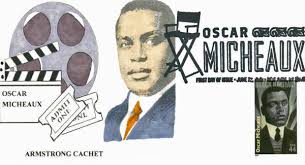
Modern Black critics have noted something that his contemporaries apparently did not. That most of the respectable black characters are fairly light skinned including Sylvia and Dr.Vivian while the likes of Rev. Ned, Efram and Red are noticeably darker. However they may be reading too much into this, Larry The Leech is also light skinned while the devout Rev.Jacobs, his sister Constance, their hardworking students and the Landry Family are all dark. It's more likely that Michaux was using the light skin/dark skin contrast to define the urban based characters from the downhome southerners rather than make any value judgements based on skin tone.
THE FILM'S RECEPTION:
The film's message and graphic violence made it instantly controversial. Censors in Chicago, Omaha, New Orleans and other cities held back it's release for two months demanding cuts of the lynching and rape scenes. Not coincidentally some of these cities had been the scene of massive white led race riots in the previous year and officials were afraid of further violence. It wasn't just white authority figures that were worried, some black leaders were concerned that the films portrayal of lynch mob violence might lead to black retaliation. However the consensus formed that the violence and repression of the Jim Crow South must be exposed to those in the North, black and white, who had never experienced it first hand. From accounts of the time it would seem that some cuts were indeed made and that the original version may have been more graphic than the single surviving print seen today. Further evidence of these cuts can be inferred by the existence of film stills showing scenes not in the film as we know it.
The film played to large audiences in black areas in various cities mostly outside the South and received substantial press coverage in the black newspapers garnering favorable reviews. The white media seems to have paid little attention to the film and it was mostly forgotten in the years since. The fact that the existing print was from a copy found in Spain, with Spanish subtitles does show that there must have been some releases in Europe.

MICHEAUX'S LATER CAREER:
Oscar Micheaux wrote seven novels and made about forty movies and it's been said that he simply told his own story of middle class black uplift over and over again. Micheaux himself admitted that his films "might have been narrow at times", but the same has been said of D.W.Griffith himself, albeit through a different prism. At any rate this is not entirely fair since he (like Griffith) did show enough variety to make a few thrillers and crime stories including "Lying Lips" and "Murder In Harlem" which are still in print and available on DVD. Many of his films are lost but the titles of some suggest a few more crime stories as well.
Micheaux continued to make films well into the sound era. These all appear to have been been starring all black casts (or mostly black) and were certainly aimed at black audiences. He never seems to have worked for a major studio. These films would have been shown at the network of black owned theatres which dotted black neighbourhoods throughout the country until the 1950's. These theatres showed a steady stream of black films such as those made by the prolific actor/director Spencer Williams (in a variety of genres), musicals by Cab Calloway and Louis Jordan, even singing cowboy westerns from Herb Jeffrey, Mantan Morland and the Four Tones as well as films made by Arthur Dreifuss, a white German director who made several films with black casts. There were comedies and romances, there was even the occasional monster movie. No sci-fi or superheros though. These films were all done on limited budgets but those that survive show they were as professionally done as a comparable Hollywood B Movie of a similar budget. Unfortunately most of these films were not saved and few were exported, more research on these films needs to be done. Oscar Micheaux died in 1951 aged 67, largely un-noticed by white Hollywood and film historians. However once a copy of "Within Our Gates" was found in the 1970's and restored it was possible to properly judge it on it's merits and assess it's place in film history, as well as his. He was given a star on The Hollywood Walk Of Fame in 1987 and a posthumous award from The Directors Guild Of America. In 1997 "Within Our Gates" was selected by The Library Of Congress for the National Film Registry as "culturally, historically and aesthetically significant". There is a Micheaux Film Festival in South Dakota and a few legacy awards in his name. In 2010 he was honoured with a U.S. stamp.
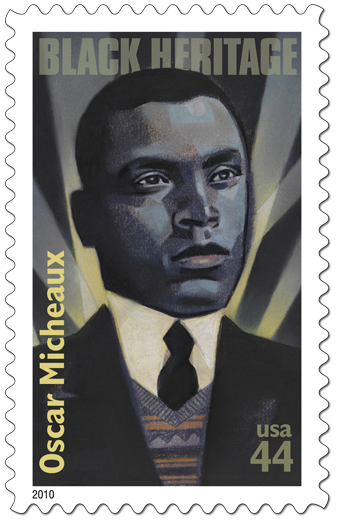
A few words about the cast of "Within our Gates"; most have no known other credits and may have been amateurs although given the incomplete records of the day this is not definitive. Most seem comfortable enough on camera to suggest some experience either in small roles in minor films (which frequently went unbilled in those days) or on the vaudeville stage and theatre groups. A few made other films with Micheaux. Two actors did have full careers however. Evelyn Preer was already established on stage in black theatre groups and would make several films as well. She would also make a name performing as a singer including recording with none other than Duke Ellington. Her career was tragically cut short when she died of complications of child birth in 1932 aged 36. Liegh Whipper, who played Rev. Ned would go on to a long career as a character actor appearing in classic films "Of Mice And Men" and "The Oxbow Incident". He worked almost up to his death in 1975 at the ripe old age of 98.
NOTE; After I wrote this I discovered that quite coincidentally the TIFF Lightbox Theater is doing an Oscar Micheaux Retrospective February for Black History Month.

No comments:
Post a Comment